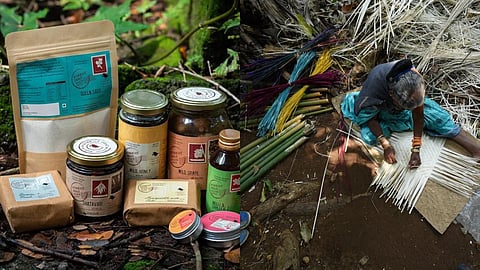
- HOMEGROWN WORLD
- #HGCREATORS
- #HGEXPLORE
- #HGVOICES
- #HGSHOP
- CAREERS
- ABOUT US
- CONTACT US

When visiting the Biennale Kada back in February, the products from Forest Post stood out. Even during the conversation with the curator of the shop Annah Chakola, this was one brand that she ended up mentioning for their incredible work as well. Forest Post is a sustainable lifestyle brand whose product range includes beeswax soaps and rubs, oils, scrubs, wild food, bamboo weaves, crafts and even macrame accessories.
In simply listing out the range of products, it might seem like one among many brands that create sustainable products. But what truly sets Forest Post apart is reflected in the name itself. Every single product that is being packaged and sold by the brand are Minor Forest Products that are collected/made by forest-dependent communities, particularly indigenous women’s enterprises across six villages in the Chalakudy and Karuvannur areas of Kerala. The brand works to help these communities add value to forest produce by combining the efforts of forest products gatherers and those of women’s groups whether it be transforming the ingredients into wellness products or accessories, making pickles and relishes with them, sorting and packaging wild-food, or making bamboo weaved baskets and mats.
The brand was founded by social entrepreneur Manju Vasudevan in 2017, as a project supported by the Keystone Foundation in the Nilgiris under the Global Alliance for Gender and Green Action initiative. Since then, they have received support from the United Nations Development Programme in India to build market links, streamline production, and build a more viable business model for the venture.
From wild grapes in brine to pickled ferns, Forest Post’s particular brand of wild food encapsulates the local produce and cuisine in these forest regions of Kerala. In working with indigenous gatherers who have generational knowledge regarding the right practices for seasonal harvesting, the brand ensures that they don’t exploit the resources that are offered up by the forest. By utilizing their native wisdom, in which sustainability is just a fact of life, the brand offers seasonal wild food products, based on availability. For these native forest-dwelling communities, a dignified source of income that doesn’t take them away from their ancestral land is a great opportunity and they can continue to be guardians of the area and use the wealth of knowledge they have.
Although honey and medicinal plants are brought from the native communities by the state forest department at fair prices, the changing rates and market uncertainties can instantly cause disruptions to their livelihood. Forest Post ensures a more reliable way for the communities to engage with the forest and make a living. The brand has helped them by finding ways to package and market non-conventional products like cycas, ferns, sour lime, wild grapes and wild asparagus (Shatavari). Borrowing influences from Malayar and Kadar culinary approaches, the products made from wild ingredients are wonderful additions to the pantry of someone who loves culinary adventure. They have products that range from Shatavari roots in honey (a result of an experiment to create a wild snack by a Kani elder), as well as sun-dried nutmeg candy, mango ginger candy, and even jackfruit papadam.
The health and beauty benefits of ingredients like medicinal plants and beeswax are being highlighted through the range of personal care products that Forest Post offers. The women from Malayar women’s collective in Karikkadav and Kallichithra create a range of personal care products using beeswax that includes soaps and lip balms. The brand also creates a range of herb-infused hair oils that are made following an indigenous approach towards hair care. This includes Shikkakai and Nelli (Amla) infused coconut oil for nourishment, and Mallow, Neem and Henna infused sesame oil for damage control.
When it comes to craft products, the brand makes use of the traditional skill of reed basketry practised among tribal people. The bamboo products that range from baskets to mats are made by the Muthuvar women weavers in the Edamalayar valley in Kerala. They gather the bamboo and process it in their traditional approach from forests close to their home, turn them into thin slivers and weave them into products. Forest Post worked with the group to assist them with additional training concerning process and design, to create more products that would do well in the Indian market. The brand also offers macrame products that are made by women from the Kadar community in Anapantham village, who have been trained in tailoring and macrame and creating accessories, planters, cloth bags and more.
By packaging and marketing the produce from the forest and working with the native communities to ensure a steady income, Forest Post as a brand is doing its part for the preservation of the knowledge of tribal communities. By empowering the females of these communities, they are also able to address deep-seated, gender issues and the need for equality in these spaces, while working collectively towards the goal of preserving the people’s relationship to nature and conserving wild resources.
You can follow the Forest Post here.
If you enjoyed reading this, here's more from Homegrown:
We Profiled 29 Seriously Interesting Tribes From India, One For Every State
The Nilgiris Wild Food Festival Is A Celebration Of Indigenous Culinary Traditions
Homegrown Self-Care Brands That Are Organic, Sustainable & Eco-Conscious
